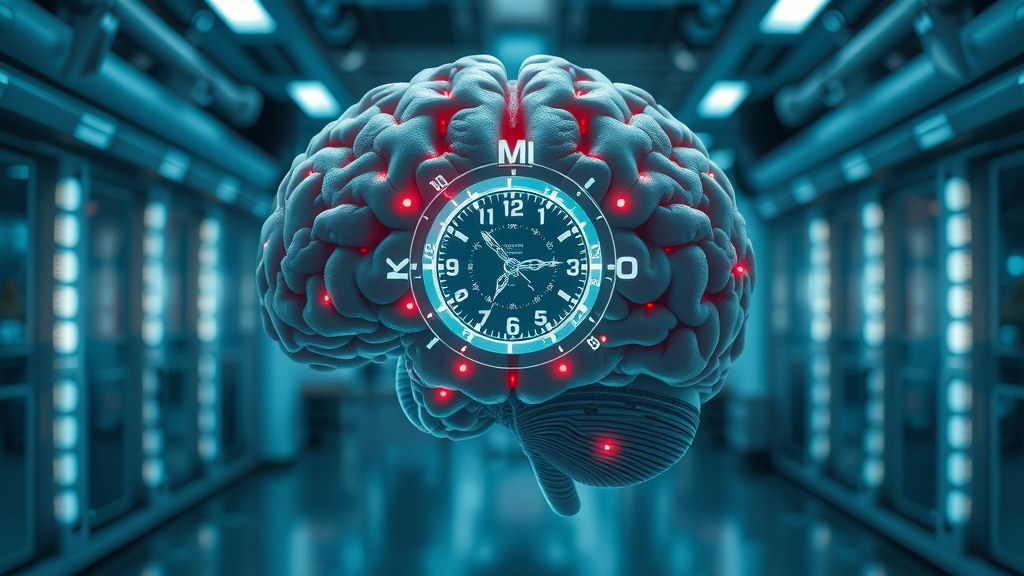Have you ever felt that time flies by or drags irritatingly slow? Understanding time perception isn't just a philosophical endeavor—it's key to enhancing our productivity and mental health. Dive into the fascinating innovations reshaping this dynamic field and discover how they could transform our daily lives.
Understanding Time Perception Research
What is Time Perception?
Time perception research is a multidisciplinary field that investigates how humans perceive and process the passage of time. This involves understanding the neurological and psychological mechanisms that influence our sense of time.
At its core, time perception considers how we estimate durations, intervals, and how events are sequenced in our minds.
For instance, our perception of time can vary dramatically based on circumstances—a moment of joy can feel fleeting, while a tedious meeting can seem to stretch on endlessly.
Researchers strive to uncover the mechanisms behind these perceptions, linking them to cognitive processes, environmental factors, and biological rhythms.

The Importance of Time Perception Research
Why is time perception research significant? The implications extend far beyond academic curiosity.
By understanding how we perceive time, we can improve various aspects of human life—from enhancing workplace productivity to managing mental health.
For example, time perception plays a critical role in decision-making and memory.
Studies suggest that improving our understanding of time-related cues can lead to better time management and even therapeutic practices targeting conditions like anxiety and depression.
In essence, time perception research has the potential to enhance our quality of life in profound ways.

Current Trends in Time Perception Research
Neural Mechanisms Behind Time Perception
Recent innovations in time perception research have led to the exploration of neural mechanisms that contribute to our understanding of time.
Advances in neuroimaging, for instance, allow researchers to visualize brain activity and identify specific regions responsible for processing temporal information.
Neurotransmitters like dopamine and serotonin have been shown to influence how we perceive time intervals. Research reveals that fluctuations in these chemicals can lead to variations in our subjective experience of time.
As researchers delve deeper into these mechanisms, it becomes clear that optimizing these neural pathways can help us develop tools to enhance time perception.

Temporal Illusions and Their Implications
Another fascinating aspect of recent time perception research is the study of temporal illusions—the phenomena where our perception of time does not align with actual time elapsed.
For example, when we are engaged in a stimulating activity, we often underestimate duration.
Understanding these temporal illusions can help design interventions across multiple sectors, such as education and workplace settings, where optimizing engagement and focus is essential.
By recognizing the subjective nature of time, practitioners can implement strategies that enhance perceptions of efficiency and productivity.
Innovations in Time Perception Studies
Technological Advances in Measuring Time Perception
In recent years, technology has revolutionized the ways in which time perception research is conducted. Innovative devices are now being developed to precisely measure individuals' time estimation abilities.
These tools not only assess time intervals, but also analyze physiological responses, linking them to subjective experiences.
Technological advancements also enable researchers to collect data in real-time, resulting in more detailed and accurate findings.
These insights allow for the creation of multifaceted approaches in fields like psychology, education, and occupational health, which can effectively address the challenges related to time perception.

The Role of Artificial Intelligence in Time Perception Research
Artificial Intelligence is increasingly finding its place in time perception research . AI algorithms are being utilized to analyze large datasets from experiments, providing deeper insights into human behavior and cognition related to time perception.
These smart systems help identify patterns, enhancing our understanding of time-related phenomena.
Furthermore, AI-driven applications can assist individuals in managing time effectively. For example, AI can suggest optimal work times based on users' productivity patterns, fostering a healthier relationship with time.
Applications of Time Perception Research
Enhancing Productivity Through Time Perception Insights
The implications of time perception research extend into the workplace as well. By optimizing our understanding of time perception, companies can implement strategies that foster productivity.
This can involve adjustments to work schedules or creating environments that promote better time-related decisions among employees.
Practical applications could range from structuring meetings around peak productivity times to cultivating practices that encourage breaks at intervals that align with natural attention spans.
Ultimately, understanding time perception equips individuals and organizations to function more efficiently.

Mental Health and Time Perception
Time perception research also has promising applications for mental health. By understanding how time is perceived, therapists can develop better interventions for conditions like anxiety, where distorted time perception often exacerbates feelings of stress and overwhelm.
For example, therapists could employ specific exercises that help patients recalibrate their time perception, promoting a more relaxed state of mind. By recognizing the intricate link between time perception and emotional wellbeing, mental health practitioners can offer more tailored support to their patients.
Expert Insights on Time Perception
As Dr. Andrew Huberman states, "Our perception of time is both conscious and influenced by biological rhythms."
Common Misconceptions About Time Perception
Debunking Myths Surrounding Time Estimation
Despite the wealth of information on time perception research , several myths persist. One common misconception is that our ability to estimate time is purely intuitive or instinctual.
In fact, numerous cognitive and environmental factors shape our perceptions of time, giving rise to consistently repetitive errors in estimation.
Debunking these myths allows for a more nuanced understanding of how perception is influenced, enabling individuals to approach time management with a better informed perspective.

Understanding the Variability of Time Perception
Another myth is that all individuals perceive time in the same manner. Time perception can vary significantly due to age, context, and psychological state.
Recognizing this variability empowers both researchers and practitioners to strategize ways to accommodate various perceptions, ultimately leading to better outcomes in practical applications.
Future Directions in Time Perception Research
Potential Areas for Further Study
The field of time perception research is continually evolving. Future investigations will focus on exploring the interplay between time perception and various cultural factors, cognitive biases, and individual differences.
By examining how social contexts and environmental factors influence our perception of time, we can develop more holistic frameworks and interventions.

The Impact of Societal Changes on Time Perception
As society evolves, so does our relationship with time. Technological advancements, globalization, and changes in work-life balance all contribute to shifts in time perception. Future research will seek to understand these dynamics and their implications on individual behavior and societal trends.
Key Takeaways
Understanding time perception research can enhance productivity and mental health.
Neuroscience and technology play critical roles in uncovering the mechanisms behind time perception.
Practical applications span workplaces and therapeutic settings, promising substantial benefits.
Ongoing research will address societal changes and their influence on time perception.

FAQs
How is time perception studied scientifically?
Time perception is studied through a variety of methodologies, including behavioral experiments, neuroimaging, and computational modeling. Researchers examine the neurological and psychological factors that influence how we perceive time intervals.
How accurate is our perception of time?
Our perception of time can be notably inaccurate, often influenced by factors such as attention, emotion, and memory. Researchers continue to explore these influences to better understand the discrepancies in time estimation.
What is time perspective in research?
Time perspective refers to the cognitive and emotional framing of past, present, and future experiences. It shapes how individuals perceive time and make decisions based on their temporal focus.
What are the five types of time perception?
The five types of time perception include:
Present time perception—how we experience time in the moment.
Prospective time perception—how we estimate future time intervals.
Retrospective time perception—how we recall and estimate past durations.
Circadian perception—how daily cycles affect our sense of time.
Ultradian perception—how shorter cycles influence time awareness and engagement.

Conclusion
As we delve deeper into the complexities of time perception research , the potential for innovation and application becomes increasingly apparent.
Understanding how we perceive time not only reshapes our productivity but also enhances our mental wellbeing, setting the stage for a more mindful and efficient approach to our daily lives.
Looking for ways to stress less and stay centered? Visit Mind Matters for quick mindfulness tips, then head back to Sacramento Living Well for more ways to feel your best every day.
---
Authored by the Sacramento Living Well Editorial Team — a publication of DSA Digital Media, dedicated to highlighting wellness, local living, and inspiring community stories throughout Greater Sacramento.
 Add Row
Add Row  Add
Add 





Write A Comment